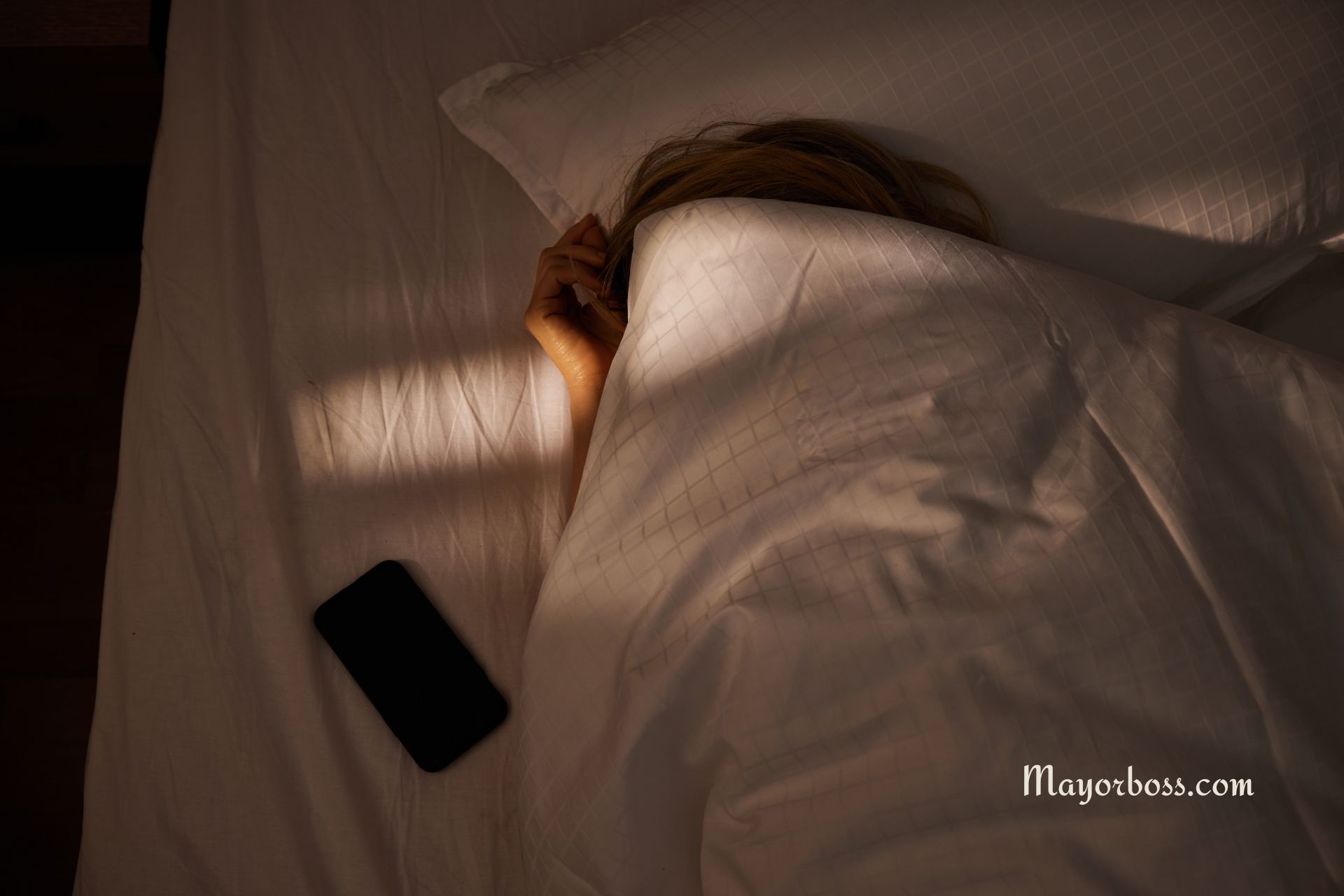You Should Not Sleep With Your Phone Nearby. Here’s Why
Smartphones – a blessing and a curse of the modern world. These pocket-sized companions streamline daily tasks, connect us to loved ones, and provide limitless entertainment. Yet, when it comes time for a good night’s rest, your phone might be a silent saboteur of your sleep quality.
In this article, we’ll delve into the reasons why sleeping near your phone is a bad habit and provide helpful tips on establishing a healthier relationship with your device.

Disrupted Sleep Cycles: Blue Light and Melatonin
- The Science: Your body has a natural sleep-wake cycle called the circadian rhythm. A key regulator of this cycle is a hormone called melatonin. When your eyes are exposed to blue light, such as the kind emitted by phone screens, melatonin production is suppressed. This suppression tricks your brain into thinking it’s still daytime, making it harder to fall asleep and stay asleep.
- The Impact: Decreased melatonin means you may experience difficulty falling asleep, restless sleep with frequent awakenings, and less restorative deep sleep. As a result, you’re likely to experience grogginess, lack of focus, and irritability the next day.
Mental Stimulation: Alertness vs. Relaxation
- Constant Connection: Our smartphones are designed to keep us engaged – a new notification, a tempting email, the latest social media update. Each time your phone buzzes or pings, your brain receives a dopamine boost, signaling that something exciting and attention-worthy awaits. This mental stimulation puts you in a state of alertness instead of the relaxed state needed for restful sleep.
- FOMO and Stress: The fear of missing out (FOMO) is all too real in our hyper-connected world. That late-night scrolling session can easily turn into doomscrolling, where you find yourself consuming negative news or comparing your life to others online. This can lead to increased stress and anxiety, which interfere with healthy sleep.
Distraction and Fragmented Sleep
- Just One More Check: It’s tempting to reach out and check your phone in the middle of the night. Maybe a notification caught your eye, or maybe you just want to see the time. Even a quick glance at your phone can pull you out of your sleep cycle and make it difficult to fall back asleep. This fragmentation of sleep reduces its overall quality.
- Nighttime Glow: The light from your phone’s screen, even while locked, can be enough to disrupt sleep. The room should be as dark as possible for optimal rest.
Potential Health Risks: Electromagnetic Fields
- Ongoing Debate: While the research is not entirely conclusive, there is some concern surrounding long-term exposure to electromagnetic fields (EMFs) emitted by cell phones. Studies have suggested possible links to increased risk of brain tumors or impacts on fertility. Although the evidence needs further clarification, the World Health Organization classifies cell phone radiation as “possibly carcinogenic to humans.”
- Precautionary Approach: Until more definitive research emerges, it might be wise to err on the side of caution and limit your exposure to EMF radiation, particularly when your body is in a restorative state.
How to Break the Phone-in-Bed Habit
- Charge Outside the Bedroom: Instead of charging your phone beside your bed, find a designated charging spot in another room. This creates a physical barrier and helps you resist temptation.
- Establish a Wind-Down Routine: Develop a calming pre-sleep ritual an hour or two before bed. This could be a warm bath, reading a relaxing book, light stretching, or gentle meditation. Signal to your mind and body that it’s time to unwind.
- Blue Light Filters or Night Mode: Many phones have built-in blue light filters or night mode settings that give your screen a warmer tone. Activate these in the evening hours to minimize melatonin suppression.
- Utilize ‘Do Not Disturb’: Take advantage of the ‘Do Not Disturb’ feature on your phone to block non-emergency calls and notifications during designated sleep hours.
- Consider an Alarm Clock: If you rely on your phone’s alarm, invest in a traditional alarm clock. This eliminates the need to have your phone within reach.
Frequently Asked Questions
Q: Are there any benefits to sleeping without my phone nearby?
A: Absolutely! You can expect benefits like:
- Improved sleep quality: Deeper, more restful sleep
- Reduced stress and anxiety: Less nighttime worry and comparison
- Enhanced focus and productivity: A clearer, more alert mind the next day
- Strengthened relationships: More mindful, present time with loved ones without phone distractions
Q: Is it okay to keep my phone on my nightstand but turned off?
A: This is a step in the right direction, as you’re eliminating light and sound distractions. However, having the device in such close proximity can still tempt you to check it. Ideally, keeping your phone out of the bedroom is the most effective way to disconnect fully.
Q: What if I need my phone for emergencies?
A: If there’s a legitimate concern about needing your phone for emergency purposes, try these solutions:
- Set your phone on ‘Do Not Disturb’ but allow calls from specific, essential contacts.
- Use a smartwatch or fitness tracker that can vibrate for important notifications.
- Place your phone slightly further from your bed so it’s still accessible but requires more effort to reach.
Conclusion: Taking Back Control
While our phones provide amazing services and connections, prioritizing healthy sleep is crucial for physical and mental well-being. By establishing mindful phone habits and creating a tech-free sleep environment, you might be surprised how profoundly your sleep quality and overall well-being improve. It won’t be an overnight adjustment, but with consistent effort, you’ll retrain your brain to treat your bedroom as a sanctuary of rest.
